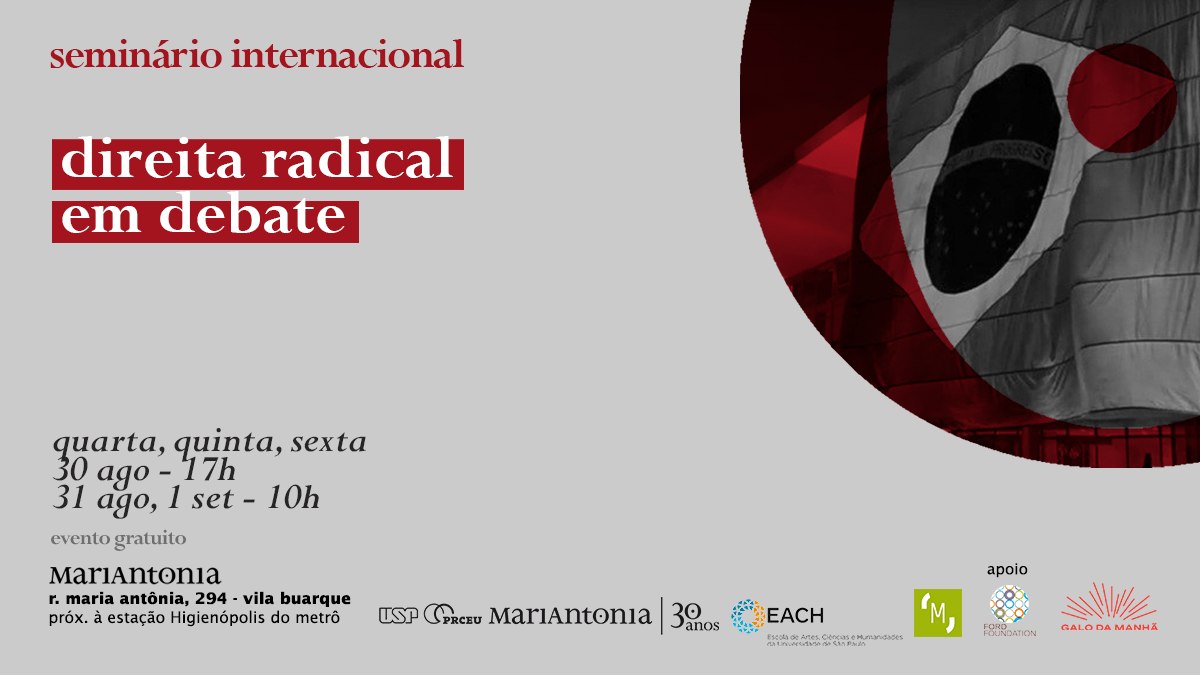On August 30, 31 and September 1st, the Centro MariAntonia will host the international seminar “Direita Radical em Debate”, in partnership with the Monitor of Political Debate in the Digital Environment of School of Arts and Human Sciences (EACH) of USP, with free admission.
The “Direita Radical em Debate” seminar aims to bring together researchers linked to programs and research groups that have been looking at the issue from different approaches and methodologies in the field of social sciences. It will include an international conference, two debates and two research panels.
Registration is available at this link – https://forms.gle/KRmNbdjM2wgZ1Yk19
Check out the schedule:
Wednesday, August 30 at 4:30 p.m.
Seminar presentation
From p.m. to 7 p.pm.
Opening lecture “The Far Right Today: Brazil in Comparative Perspective” with Cas Mudde (in English with sequential translation into Portuguese)
Presentation + round of questions
Who is Cas Muddle?
A Dutch political scientist, he is one of the leading experts on political extremism and populism in Europe and the United States. He is an associate professor at the School of Public and International Affairs at the University of Georgia and an adjunct professor at the Center for Research on Extremism (C-REX) at the University of Oslo. Author of several books on the subject, among the most recent published in Brazil are A Extrema direita hoje (EdUERJ, 2022) and O Regresso da Ultradireita – Da Direita Radical à Direita Extremista (Editorial Presença, 2020).
Thursday, August 31
From 10 to 12h30
Panel: Ascensão da direita radical
Masculinismo e extrema direita no Brasil sob a perspectiva das Ciências Sociais
Bruna Camilo | PhD from Pontifícia Universidade Católica (PUC) of Minas Gerais
Brasil Paralelo e a nova extrema direita brasileira (1990 – 2023)
Mayara Balestro | Laboratório de História Política e Social (LAHPS) researcher of Universidade Federal de Juiz de Fora (UFJF)
Do Bolsonaro zuero ao Bolsonaro presidente: a contracultura politicamente incorreta que massificou ideias conservadoras
Luiza Foltran | Monitor of the Political Debate in the Digital Environment of Escola de Artes, Ciências Humanas (EACH) researcher of USP
From 2:30 p.m. to 5 p.m.
Table: Populismo? Fascismo? Autoritarismo?
Over the last decade, in different countries, traditional political forces have been losing ground to new right-wing forces proposing radical social transformation. Conservative, traditionalist ideas and criticisms of liberal democracy are gaining more and more ground in the political debate. Forms of mobilization previously associated with the left are rapidly entering the repertoire of this new right that combines street mobilization with expressive electoral results. Some authors have interpreted this process as the rise of a new right-wing populist wave and others as a resurgence of fascism. Is it possible to propose a single concept that encompasses these multiple international experiences? How do classic categories – such as fascism, authoritarianism and populism – contribute to characterizing them? Or do traditional categories make it difficult to understand the new features of these contemporary political phenomena?
Exhibitors:
André Singer | Professor at the Department of Ciência Política da Faculdade de Filosofia, Letras e Ciências Humanas of USP
Camila Rocha | CEBRAP researcher
Rodrigo Nunes | University of Essex researcher
Friday, September 1st
From 10 am to 12:30 am
Panel: Raízes e consequências da direita radical
Como a extrema direita usa o direito contra a democracia
Contado Hubner Mendes | Professor at Faculdade de Direito (FD) of USP
A colonização do judaísmo pelo bolsonarismo: estratégias da nova extrema direita brasileira
Michel Gherman | Instituto de Filosofia e Ciências Sociais da Universidade Federal of Rio de Janeiro (UFRJ)
A extrema direita faz agitprop: estética de combate e o mito de mil faces
Pedro Arantes | Escola de Filosofia, Letras e Ciências Humanas of Universidade Federal de São Paulo (Unifesp)
From 2:30 pm to 5 pm
Table: Por que agora?
In recent years, in very different countries such as the United States, Brazil, the Philippines, India, Turkey, Hungary and Italy, we have seen electoral victories for political projects with authoritarian leanings based on discourses against the old political and cultural elites. Their more or less simultaneous emergence does not seem coincidental. Some analyses have emphasized the structuring role of the 2008 economic crisis or the resentments generated by the effects of economic globalization. Other analyses draw attention to the increasingly central role of social media, which have abolished intermediaries and promoted indignant and incendiary content. There are also those who highlight the emergence of new social mobilizations that have given voice to conservative and anti-system groups. After all, why now?
Exhibitors:
Eduardo Costa Pinto | Professor at the Instituto de Economia of Universidade Federal of Rio de Janeiro (UFRJ)
Guilherme Casarões | Professor at the Escola de Administração de Empresas de São Paulo of Fundação Getúlio Vargas (FGV EAESP)
Leticia Cesarino | Professor at the Centro de Filosofia e Ciências Humanas of Universidade Federal de Santa Catarina (UFSC)
Service
Seminário internacional “Direita radical em debate”
Registration | https://forms.gle/KRmNbdjM2wgZ1Yk19
Where | Centro MariAntonia da USP – edifício Rui Barbosa
Rua Maria Antônia, 294, Vila Buarque – São Paulo – near of Higienópolis metr station
When | 30 de agosto a 1º de setembro de 2023
How much | Free
Translated by: Lara Yoshime Shizuko Fukushima





